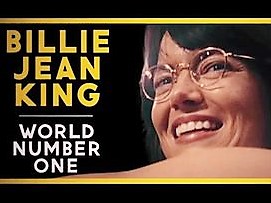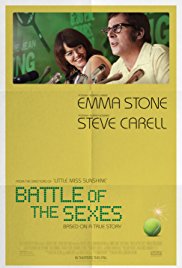Battle of the Sexes *** (2017, Emma Stone, Steve Carell, Andrea Riseborough) – Movie Review
Expert screen-writer Simon Beaufoy, of The Full Monty and Slumdog Millionaire fame. retells the true story of the 1973 tennis match between female world number one Billie Jean King and male ex-champ and gambler/hustler Bobby Riggs. It gets more or less perfect casting in Emma Stone and Steve Carell, who give ideal performances, nothing Oscar winning but incredibly professional.
Danny Boyle was to direct, but bailed when the cast of T2 Trainspotting all suddenly became available for him to make his long planned sequel. Instead, in came husband and wife directing team Jonathan Dayton and Valerie Faris, from 2006’s Little Miss Sunshine (which also starred Steve Carell).
The film is good but somehow still a disappointment. It runs through the now familiar story in a familiar kind of way. Boyle might have turned in a much better movie, more daring, risky and challenging, more imaginative and creative. Dayton and Faris’s film feels way too cosy and comfortable, dealing with these long ago events in a knowing, lofty, superior kind of way. It needs to be more provocative.
Hindsight is total vision. We all know how down-trodden woman and gays were 40 years ago by male chauvinist pigs, but this film is just going to confirm our cosy liberal knee-jerk values. We need to know a lot more about the why and the wherefores, dig a lot deeper.
All the men in this film are weak, pathetic, misguided or greedy. There’s not a decent role model of a man in sight. All the women are admirable, feisty and fighters. Billie Jean King is portrayed in a saintly kind of way, in a wart-free portrait. She may have been exactly like this, but neither the script nor Stone manage to make her three dimensional. They do make her ultra sympathetic though.
Carell’s difficulty is his character is actually a caricature, a self-created cardboard cutout to please the crowds, cause controversy to bring himself publicity, and continue a career decades past its sell-by date. Naturally neither the script nor Carell manage to make Riggs three dimensional either, though they pull a trick at the end to make him finally pathetic and then sympathetic.
The film’s main problem is deja vu. Having seen the trailer at screenings at least 20 times, I felt I’d seen the whole movie before. Certainly I’d seen all the highlights, best bits and best lines. It damaged the experience of watching the movie. OK, yes, I know that’s not the film’s fault.
Then there is the deja vu problem that have been previous films about the King-Riggs match, including Jane Anderson’s 2001 TV movie When Billie Beat Bobby, starring Holly Hunter, and especially James Erskine and Zara Hayes’ 2013 documentary The Battle of the Sexes. This documentary is so much better than the 2017 re-creation in terms of period detail, atmosphere, personalities, issues and actual tennis that it exposes the thinness and weaknesses of the new movie clearly. In the match between the documentary The Battle of the Sexes versus the movie Battle of the Sexes, it’s a clear, straight sets win for the documentary.
Nevertheless, the movie Battle of the Sexes is an easy crowd-pleaser. It goes for the broad strokes, says the right things, and is effortlessly, though sometimes effortfully, nice. Stone and Carell always come over as effortlessly nice in more or less everything they do. They are not hard stretched here, but working comfortably in their game. They are pretty much always welcome, never absolutely extraordinary like the great stars of old, but extraordinary enough.
As an expert on the trailer, I should mention that the film’s strongly emphasised lesbian angle hardly appears in the trailer, which is all about King v Riggs, which the film is not. There’s just a brief I’m too busy trying to win at tennis to have relationships moments between Stone and Andrea Riseborough as Marilyn Barnett, Mrs King’s hairdresser who becomes her lover. Riseborough does not manage to be sympathetic at all here.
Her character comes over as a person determined to muscle in on Billie-Jean, not particularly concerned that the tennis champ is married (to a man) even when she bumps in to him unexpectedly in a hotel, or that Billie-Jean has never had a thing with a woman before, and continues to pursue her when B-J K says ‘I’m too busy trying to win at tennis to have relationships’ and keeps popping up at tours and matches by surprise. In another story, another era, that could look sinister or like stalking. Indeed, it is easy to imagine a fantasy story horror movie version of this. If it had been made in the Eighties, John Carpenter might have directed Glenn Close as the stalker.
The other women’s roles – tennis star Rosie Casals (Natalie Morales), Mrs King’s manager Gladys Heldman (Sarah Silverman) and Riggs’s rich and long-suffering wife Priscilla (Elisabeth Shue) are weakly written and give the actresses problems. Jessica McNamee awkwardly plays Margaret Court as a great tennis player but a not very nice person. That is a cypher character too, built around the idea of making Billie-Jean seem every better.
Can I mention that in the film Billie-Jean cheats openly with Marilyn Barnett on her husband Larry King (Austin Stowell) whose name she has. Larry is portrayed as weak but kind and understanding. He’s a wimp, certainly compared to his wife, but he is loyal. If this story was about a wife who was cheating with another man, the heroine would be judged poorly, I guess.
Billie-Jean is shown here as an all-time great champion at tennis and for women’s and LGBT rights. A bit more about these three things would make for a much more riveting movie, though a less mainstream and popular one, I suppose. How had it taken so long for the women’s movement and sexual revolution to take effect? How had the tennis world managed to evade them?
Bill Pullman has a huge role as tennis supremo Jack Kramer, but he is battling a horrible caricature. This good actor can’t make a three-dimensional character out of the film’s moustache-twitching villain, so he goes kind of untruthful to make it work. In the end it’s Kramer not Riggs who is the film’s bad guy, the monster, everyone else is a victim of his while old guy supremacy. I’m wondering if the reality was a bit more complicated than this. Maybe, maybe not, but the film won’t tell me, or quite persuade me.
Finally there is Alan Cumming, who plays British gay costumier Cuthbert ‘Ted’ Tinling. This caricature is truly awful, and Mr Cumming should have had not part in it. His pro-gay speech to Mrs King after the tennis match at the end seems fake and tacked on – ‘one day there will be a better world, meanwhile enjoy the dance’. And so, back to hindsight. Woman and gays have a better world in the US and UK and a few other places, but more than 40 years on the world is in a worse mess that it was in 1973. Maybe Ted Tinling is right: ‘one day there will be a better world, meanwhile enjoy the dance’.
© Derek Winnert 2017 Movie Review
Check out more reviews on http://derekwinnert.com



